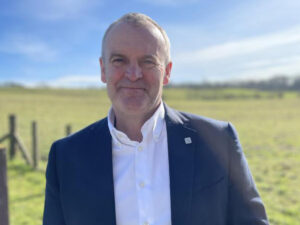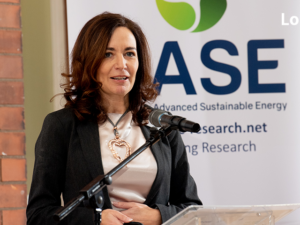
At Tetra Tech, we use our Leading with Science® approach to advise our clients on the best, most sustainable solutions for their business on a daily basis.
With COP26 starting in Glasgow today, some 190 world leaders will meet to discuss a global strategy for creating a more sustainable future and hopefully, reducing the devastating impact climate change is having on our world.
With so many areas to tackle, the challenge can seem overwhelming, and the engineering industry has a huge part to play in finding solutions.
But what should be a priority? We’ve asked a selection of our experts – from all different sectors and levels – on what outcomes they’d like to see from this conference.
Craig Hatch, President
“Working for Tetra Tech and Leading with Science® every day to advance our clients’ projects around the globe, I firmly believe there has never been a more important conference. COP26 will bring together world leaders who, we hope, will follow the science and collectively commit to taking the actions required to safeguard our planet and future generations.
“There is a path to get there – low carbon technologies are available and advancing all the time. If our leaders take a truly long-term view, they can all be heroes in forming an agreement that will slow the heating up of our planet.”

Craig Hatch, President
Anthony Sherriff, Associate – Digital Construction & Architecture
“Electric vehicles are lauded as the future of personal and public transport, but without investment into EV charging infrastructure, it’s pointless. Government should ban the opening of new petrol stations that don’t include EV charge ports and integrate it into town planning and policy.
“New houses have also got to be designed for the long term, particularly affordable stock. I’m currently working with Derby City Council on affordable housing and instead of looking for the cheapest route, we’re targeting a standard which won’t even come into play for five years. This type of futureproofing approach is how clients can make a huge impact on sustainability targets.”
Grainne Maguire Conneely – Graduate Structural Engineer
“A lot of focus has been on reducing the operating carbon emissions, instead of limiting the upfront carbon associated with a construction project. If anything, I’d like to see a commitment to build less and for there to be incentives for developers to refurbish and retrofit existing structures rather than building new.
“We see new construction as the primary pillar of our industry and so it can be difficult to accept we need to build less. However, ‘building less’ won’t reduce our workload. It will just challenge us more as engineers and project managers.”

Sam McCloskey – Director of Sustainability and Climate Resilience
Sam McCloskey – Director of Sustainability and Climate Resilience
“We need to redress the negative mantra associated with climate change by focusing on some of the positive outcomes that a unilateral and re-concerted effort to combat climate change will bring. While jobs in the extraction and processing of fossil fuels will be lost, there will be a just transition to new jobs and growth in the ‘green economy’ which apply to all four of COP26 goals.
“It is also important that COP26 recognises the importance of encouraging new technological development in reaching longer term, global, Net Zero targets as many of the solutions that will be in place in 2050 are only at pilot phase now.”
Nathan Holloway, Managing Director – Project Management
“We need commitment. After COP26 is over, UK Government must introduce binding regulations which underpin verbal pledges, otherwise we risk ambitions simply becoming gestures made because we were the host.”
Luke Verrall, Senior Ecologist
“I would like to see a far greater commitment to dealing with flood risk by replanting our uplands. This will allow more water to be held in these environments and reduce the need to hard engineer flood solutions in urban areas, as well as improve biodiversity. Developers should be incentivised to set-aside areas of their sites for biodiversity – which we’re already beginning to see in England through Biodiversity Net Gain (BNG), although it currently isn’t mandatory.
“Likewise, COP26 must secure harsher sanctions for those who turn a blind eye to illegal deforestation of rainforests. Global nations must unite to produce a strategy that puts a greater financial value on rainforests and other rare environments in their current (or improved) state than as desolate, logged environments.”
George Milburn, Graduate Planner
“I’m Welsh, and I see the geographical potential this country has for opportunities relating to wind, solar and hydro-electric power. However, the threats of extreme weather events such as coastal flooding jeopardise its future. I want COP26 to back up the Wales Zero Carbon Plan and focus on harnessing renewable energy sources, investing in their required facilities and infrastructure, alongside mitigating the environmental impacts currently threating Wales.
“The revival of plans for a £1.7bn ‘Tidal Lagoon’ in Swansea highlights the true potential of renewable energy schemes in the contemporary environment. It shows that high-profile projects can now be realistic and sustainable through good planning.”

George Milburn, Graduate Planner
Murray Ross, Head of Project and Programme Management Profession & Southern Region Director
“We need to start mapping sustainability and climate change thinking into the core of contracts, assigning specific environmental KPIs into contracts and planning them into delivery at the very beginning across all sectors. This must be driven and mandated by governments through legislation, to address and incentivise sustainable thinking.”
Lina Zhao, Principal Transport Modeller
“Transport contributes to 27% of the UK’s total emissions. To decrease car usage, we need to influence policy makers and make urban areas better place for Active Travel, like cycling and walking. This will reduce carbon emissions and congestion from cars, particularly in city centres. Our work can help policy leaders understand how Active Travel aligns with government net zero ambitions, as well as making safer, cleaner and better places for the public to work and live.”

Saffron Garey, Bid Coordinator
Saffron Garey, Bid Coordinator
“I’d love to see a commitment for all publicly-funded and commissioned work be carbon neutral or carbon negative, agreed at the tendering process. The public sector is responsible for a huge amount of infrastructure and by leading by example, the supply chain will prioritise sustainable innovation and the private sector should hopefully follow suit.”
John McCullogh, Principal Consultant – Sustainability
“Currently, 40 per cent of UK emissions come from households. We need a strategy to move existing domestic properties away from fossil fuels. Bringing back grants to cover the change of heating systems and install low or zero carbon technologies would be a huge incentive to retrofit properties.”
Nigel Mann, Director – NALO & Archaeology
“I’d like to see considerable commitments to reducing landfill, along with clearer understanding around the link between greenhouse pollutants and local air quality. This should be reinforced by legislation and passed on to the public, as currently the issues are confused.”
Martin Brown, Associate – Archaeology
“There is a good deal of good work on Historic Environment and climate change already, but the Government still needs to remove VAT from materials for refurb/repair of historic buildings. These structures embed energy and are often more climate resilient than modern, disposable buildings, and resources should look into how they can be preserved.”